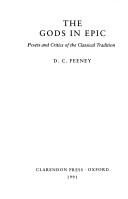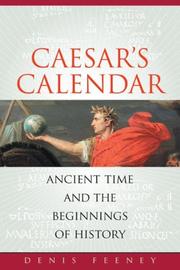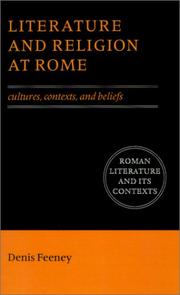| Listing 1 - 5 of 5 |
Sort by
|

ISBN: 019814055X 9780198140559 Year: 1991 Publisher: Oxford: Clarendon,
Abstract | Keywords | Export | Availability | Bookmark
 Loading...
Loading...Choose an application
- Reference Manager
- EndNote
- RefWorks (Direct export to RefWorks)
Mythologie romaine --- --Mythologie grecque --- --Poésie latine --- --Épopée --- --Epic poetry, Classical --- Epic poetry, Classical --- Gods, Greek, in literature --- Gods, Roman, in literature --- History and criticism --- Theory, etc --- -Epic poetry, Classical --- -Gods, Greek, in literature --- Classical epic poetry --- Classical poetry --- -Theory, etc --- History and criticism&delete& --- Mythologie grecque --- Poésie latine --- Épopée --- Epic poetry, Classical - History and criticism --- Epic poetry, Classical - History and criticism - Theory, etc
Book
ISBN: 9780674055230 0674055233 0674496027 0674496043 067498658X Year: 2016 Publisher: Cambridge, Massachusetts: Harvard university press,
Abstract | Keywords | Export | Availability | Bookmark
 Loading...
Loading...Choose an application
- Reference Manager
- EndNote
- RefWorks (Direct export to RefWorks)
"We take the existence of a literature in the Latin language for granted, but the emergence of this literature is a very strange moment in history. Latin literature should probably not have come into being in the form it took. This book explores the opening phase of Latin literature, from 240 to 140 BCE. The period begins with the first stage productions of Greek plays translated into Latin, which were also the first translations of Greek literary texts into any other language; it closes with the Romans in possession of a large-scale literature in Latin based on the literature of the Greeks, together with a developed historical tradition about their past and a mythology that connected them to the inheritance of the Greeks. The book uses a range of comparative evidence from both the ancient and the modern worlds in order to provide a context for understanding what the Romans did. The book recovers a great range of possibilities for cultural interaction in the ancient Mediterranean, with languages and texts sometimes interchanging quite freely and sometimes being blocked. The book argues that the Roman translation project and the resulting literature were highly anomalous in an ancient context: translation of literature was extremely rare in the world known to the Romans, and the ancient Mediterranean hosted many very successful cultures that had no kind of equivalent to the widely diffused text-based literary systems of the Greeks. The transformation of the Romans' Italian alliance into a Mediterranean imperial power provides the context for the revolution in their cultural life that led to what we call "Latin literature."" --
Latin literature --- Greek language --- Comparative literature --- Greek influences. --- Influence on Latin. --- Greek and Latin. --- Latin and Greek. --- Greek influences --- Influence on Latin --- Greek and Latin --- Latin and Greek --- Latin literature - Greek influences --- Greek language - Influence on Latin --- Comparative literature - Greek and Latin --- Comparative literature - Latin and Greek

ISBN: 9780520251199 0520251199 Year: 2007 Volume: 65 Publisher: Berkeley: University of California press,
Abstract | Keywords | Export | Availability | Bookmark
 Loading...
Loading...Choose an application
- Reference Manager
- EndNote
- RefWorks (Direct export to RefWorks)
Table of contents : Publisher description :
Calendar, Roman --- Time --- Chronology, Roman --- Synchronization --- Historiography --- City and town life --- Social aspects --- Political aspects --- Rome --- Social life and customs --- Calendar, Roman. --- Chronology, Roman. --- Synchronization. --- Rome (Italy) --- Historiography. --- Social life and customs. --- Civilization --- Greek influences. --- 529.309 --- Calendrier romain --- Temps --- Chronologie romaine --- Synchronisation --- Historiographie --- Vie urbaine --- Aspect politique --- Moeurs et coutumes --- Civilisation --- Influence grecque --- City life --- Town life --- Urban life --- Sociology, Urban --- Roman chronology --- Roman calendar --- Hours (Time) --- Geodetic astronomy --- Nautical astronomy --- Horology --- Synchronism --- Time measurements --- Greece --- Political aspects. --- Time - Social aspects - Rome --- Time - Political aspects - Rome --- Historiography - Rome --- City and town life - Rome --- Rome - Social life and customs

ISBN: 0521551048 0521559219 9780521551045 9780521559218 Year: 1998 Publisher: Cambridge: Cambridge university press,
Abstract | Keywords | Export | Availability | Bookmark
 Loading...
Loading...Choose an application
- Reference Manager
- EndNote
- RefWorks (Direct export to RefWorks)
Religious poetry, Latin --- Religious drama, Latin --- Latin literature --- Mythology, Roman, in literature --- History and criticism --- Rome --- Religious life and customs --- Mythology, Roman, in literature. --- Religion and literature --- Poésie religieuse latine --- Théâtre religieux latin --- Littérature latine --- Mythologie romaine dans la littérature --- Religion et littérature --- History and criticism. --- Histoire et critique --- Religious life and customs. --- Religion. --- Vie religieuse --- Religion --- 292.07 --- Latin religious poetry --- Latin poetry --- Latin religious drama --- Latin drama --- Literature --- Literature and religion --- Religion Classical Roman --- Moral and religious aspects --- Religious poetry, Latin - History and criticism --- Religious drama, Latin - History and criticism --- Latin literature - History and criticism --- Rome - Religious life and customs --- Religious poetry, Latin - History and criticism. --- Religious drama, Latin - History and criticism. --- Latin literature - History and criticism. --- Religion and literature - Rome.

ISBN: 0521642469 052103034X 0511180934 0511066236 0511059922 0511331118 0511482426 1280417501 1139145975 0511068360 9780511066238 9780511482427 9780521642460 Year: 2002 Publisher: Cambridge, U.K.: Cambridge university press,
Abstract | Keywords | Export | Availability | Bookmark
 Loading...
Loading...Choose an application
- Reference Manager
- EndNote
- RefWorks (Direct export to RefWorks)
This book explores the whole range of the output of an exceptionally versatile and innovative poet, from the Epodes to the literary-critical Epistles. Distinguished scholars of diverse background and interests introduce readers to a variety of critical approaches to Horace and to Latin poetry. Close attention is paid throughout to the actual text of Horace, with many of the chapters focusing on reading a single poem. These close readings are then situated in a number of different political, philosophical and historical contexts. The book sheds light not only on Horace but on the general problems confronting Latinists in the study of Augustan poetry, and it will be of value to a wide range of upper-level Latin students and scholars.
Epistolary poetry, Latin --- -Influence (Literary, artistic, etc.) --- Laudatory poetry, Latin --- -Verse satire, Latin --- -Artistic impact --- Artistic influence --- Impact (Literary, artistic, etc.) --- Literary impact --- Literary influence --- Literary tradition --- Tradition (Literature) --- Art --- Influence (Psychology) --- Literature --- Intermediality --- Intertextuality --- Originality in literature --- Latin verse satire --- Latin poetry --- Latin laudatory poetry --- Latin epistolary poetry --- History and criticism --- Horace --- -Horace --- Orazio --- Horacij Flakk, Kvint --- Criticism and interpretation --- Rome --- In literature. --- Poésie satirique latine --- Influence (Literary, artistic, etc.) --- Verse satire, Latin --- History --- Criticism and interpretation. --- Horatius Flaccus, Quintus --- Horatius Flaccus, Q. --- In literature --- History and criticism. --- Poésie épistolaire latine --- Poésie élogieuse latine --- Histoire et critique --- Epistolary poetry [Latin ] --- Laudatory poetry [Latin ] --- Verse satire [Latin ] --- Rome in literature --- Gorat︠s︡īĭ --- Gorat︠s︡iĭ Flakk, Kvint --- Horacij --- Horacio, --- Horacio Flaco, Q. --- Horacjusz --- Horacjusz Flakkus, Kwintus --- Horacy --- Horaṭiyos --- Horaṭiyus --- Horats --- Horaz --- Khorat︠s︡iĭ --- Khorat︠s︡iĭ Flak, Kvint --- Orazio Flacco, Quinto --- הוראציוס --- הורטיוס --- Arts and Humanities --- Influence (Literary, artistic, etc.) - History - To 1500 --- Epistolary poetry, Latin - History and criticism --- Laudatory poetry, Latin - History and criticism --- Verse satire, Latin - History and criticism --- Horace - Criticism and interpretation --- Rome - In literature
| Listing 1 - 5 of 5 |
Sort by
|

 Search
Search Feedback
Feedback About UniCat
About UniCat  Help
Help News
News